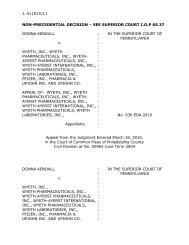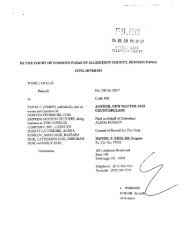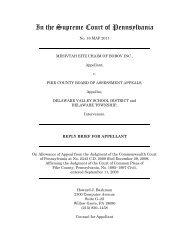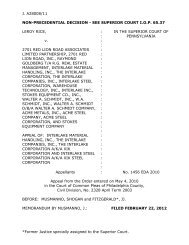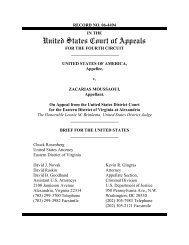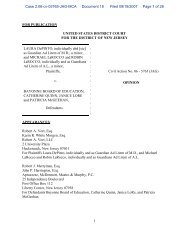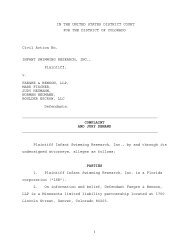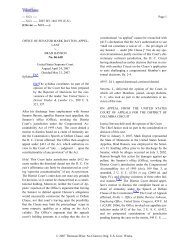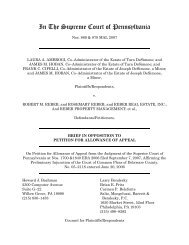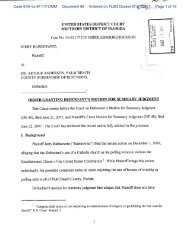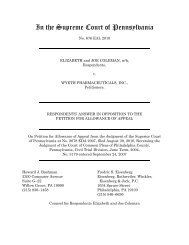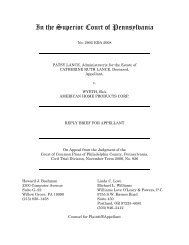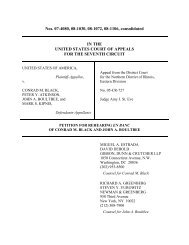Stone v. Bear, Stearns & Co., Inc. - How Appealing
Stone v. Bear, Stearns & Co., Inc. - How Appealing
Stone v. Bear, Stearns & Co., Inc. - How Appealing
Create successful ePaper yourself
Turn your PDF publications into a flip-book with our unique Google optimized e-Paper software.
Case 2:11-cv-05118-LDD Document 22 Filed 05/29/12 Page 22 of 35<br />
In any event, the Third Circuit has set an extremely high bar for vacatur-worthy<br />
“misbehavior.” We may not vacate an arbitration aware for “misbehavior” under Section 10(a)(3)<br />
unless the petitioner shows misconduct so severe that it denies the aggrieved party a fundamentally<br />
fair hearing. Apex Fountain Sales, <strong>Inc</strong>. v. Kleinfeld, 818 F.2d 1089, 1094-95 (3d Cir. 1987) (holding<br />
that “[u]nder Federal law, misconduct apart from corruption, fraud, or partiality in the arbitrators<br />
justifies reversal only if it so prejudices the rights of a party that it denies the party a fundamentally<br />
fair hearing.”); Teamsters Local 312 v. Matlack, <strong>Inc</strong>., 118 F.3d 985, 995 (3d Cir. 1997) (same);<br />
Sherrock Bros., <strong>Inc</strong>. v. DaimlerChrysler Motors <strong>Co</strong>., 260 Fed. App’x 497, 501 (3d Cir. 2008) (non-<br />
precedential) (same). Other circuits take a similar approach. See, e.g., Bradley v. Merrill Lynch &<br />
<strong>Co</strong>., 344 Fed. App’x 689, 690-91 (2d Cir. 2009) (“When a party asserts that the arbitrator engaged in<br />
misconduct, ‘except where fundamental fairness is violated, arbitration determinations will not be<br />
opened up to evidentiary review.’”) (citation omitted); Laws v. Morgan Stanley Dean Witter, 452<br />
F.3d 398, 399 (5th Cir. 2006) (“To constitute misconduct requiring vacation of an award, an error in<br />
the arbitrator’s determination must . . . so affect the rights of a party that it may be said that he was<br />
deprived of a fair hearing.”) (citation omitted); Louisiana D. Brown 1992 Irrevocable Trust v.<br />
Peabody <strong>Co</strong>al <strong>Co</strong>., No. 99-3322, 2000 WL 178554, at *6 (6th Cir. Feb. 8, 2000) (“[T]he standard for<br />
judicial review of arbitration procedures is merely whether a party to arbitration has been denied a<br />
fundamentally fair hearing.”) (citation omitted). This interpretation of “misbehavior,” limited to<br />
deprivations of fundamental fairness, fully comports with the Supreme <strong>Co</strong>urt’s pronouncement in<br />
Hall Street that the terms “misconduct” and “misbehavior” (among others) in Section 10 of the FAA<br />
denote “extreme arbitral conduct.” 552 U.S. at 586.<br />
Here, for all the reasons discussed in relation to “evident partiality,” we see no “misbehavior”<br />
by arbitrator Marston that could fairly be characterized as “extreme arbitral conduct.” At worst,<br />
22



